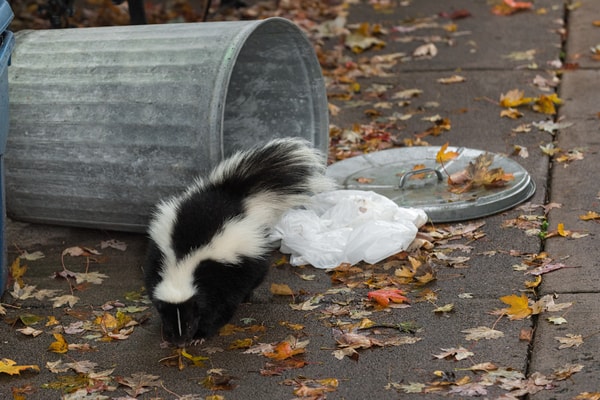Do you want a skunk problem in your yard? Didnt' think so. Learn about skunks and how to help keep them away.

The infamously foul-smelling skunk is among the most unpleasant of unwanted animal guests that you should keep out of your yard. Scent aside, however, skunks can also be a problem because they love to dig, tunnel and otherwise make a mess of your yard. While the average skunk is usually no bigger than a house cat, it can be as damaging to the integrity of your home as a much larger animal.
As with all pest mammals, the best offense is a good defense. That means remaining observant, taking precautionary measures and being prepared in case of a skunk encounter. So, let’s get to know a bit more about skunks and what makes them unique.
Where do skunks live?
Skunks are native to the Americas and can be found all across the continental United States. More specifically, skunks live in underground shelters called burrows. Often, skunks will take over burrows abandoned by other animals who like to excavate, like rabbits, badgers and foxes. Skunks, especially females about to deliver young, will also dig their own burrows.
Overall, skunks will seek out any available and convenient location for their dens. They look for warmth and easy access to food and water, which most likely can be found on your property. In areas populated by humans, skunks can make their dens under houses, under decks, in basements, in garages, under wood sheds or woodpiles, or anywhere else that provides shelter from the elements.
What attracts skunks to my yard?
Food in plentiful supply will always be irresistible to wild animals, and skunks are no exception. An accessible water supply is also likely to attract the black-and-white striped pests.
What do skunks eat? Grubs — the underground-dwelling larvae of insects such as Japanese beetles and June bugs — are just one part of the skunk diet. These grubs are most plentiful in the colder months of the year, as they lay dormant in preparation for their spring and summer metamorphoses. Grubs feed most commonly on grassroots, and their presence can go undetected until dead patches begin to pop up on your lawn.
At one level, skunks can be beneficial animals, ridding your turf of these near-invisible plant parasites. Unfortunately, skunks are not terribly picky eaters. They are technically omnivorous. This means that carelessly secured garbage receptacles behind your home and pet food left on a porch, patio or in a garage or shed can also be very tempting to a skunk.

How can I keep skunks out of my yard?
If you're concerned about skunks in your yard, the best solution is to make your yard a less attractive habitat. One thing you can do is be on the lookout for patches of dead grass and eliminate any grub infestations you may have. Healthy populations of fat, juicy grubs are an open invitation to skunks to come and claw up your yard.
Make sure all seals and lids on your trash cans and recycle bins are secure, and periodically clean out these receptacles to remove odors and stray bits of waste. If you have fruiting trees and plants in your yard or garden, don't let fruit over-ripen, fall and rot on the ground. Be sure to remove any wild animal carcasses that you may find on your property, especially if you own a cat or dog who likes to hunt. Finally, take the Humane Society’s advice, by building an animal fence, and cordon off any vulnerable areas around your home’s foundation using L-footer–style fencing.
A Terminix® pest management professional can build a plan that helps keep skunks and other wildlife off your property.



